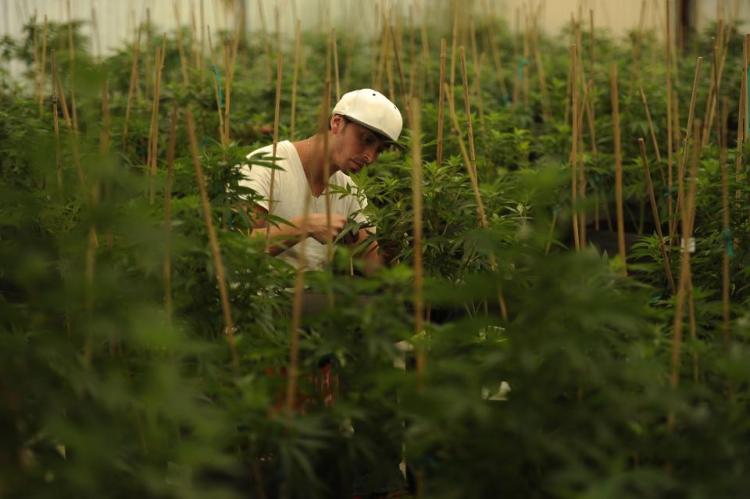Why Patent Cannabis? For Markets, Mostly.
On May 20, Charlotte’s Web, the Colorado-based CBD giant and arguably one of the biggest names in legal cannabis, announced that the company was awarded its second federal patent on a cannabis plant.
Unlike the company’s 2018 plant patent on a Farm Bill-compliant high-CBD hemp cultivar—which was the first hemp strain to receive federal intellectual property protection—US Patent No. 10,653,085 is a utility patent.
This means, after satisfying a more rigorous process, including dropping off thousands of seeds at an official United States depository, Charlotte’s Web now claims as its intellectual property both the cultivar of hemp the company calls CW1AS1 as well as “methods” of plant production and cannabinoid extraction.
Okay! But so what? Why patent a hemp strain—why patent two? What does it all mean? Does Charlotte’s Web now have legal claim to the entire CBD game?
To the last question, no. And as for what this means, for normal people and cannabis consumers, very little. For patent attorneys or competitors of Charlotte’s Web in the CBD industry, it portends a little more, but just a little.
At least for now, cannabis patents like this one aren’t really intended to defend intellectual property in court—which is where a patent has its most practical value.
No, this patent is probably meant for the market. Patents like this exist mostly for companies to satisfy and woo investors, for whom a company’s ability to say “Look! I have a patent” might be the difference between signing a check, or not. And like all publicly traded cannabis companies, Charlotte’s Web has a lot of spooked and angry investors who need pleasing.
Patents “generate interest in the company, and are something investors would look at,” said Jonathan Hyman, a patent attorney and partner at the Los Angeles office of Knobbe Martens.
Whether Charlotte’s Web would enforce the patent, and how, “remains to be seen,” he added.
Company officials were not available to discuss the matter. In a statement provided by Sylvia Tawse, the company’s director of communications, CEO Deanie Elsner said Charlotte’ Web “will continue to pursue patent protection for unique and novel hemp genetics developed by our horticulture division.” Whether that meant there are any pretenders the company plans to sue, she did not say.
Though cannabis-related patent applications have been a thing since well before legalization and have tripled since 2015, as IP Watchdog noted, the mere phrase “cannabis patent” can still be triggering in cannabis circles. Patent talk can often lead to galaxy-brain thinking like the “Monsanto is supporting legalization in order to steal cannabis” or the “Philip Morris is buying up land in Humboldt County” conspiracy theories.
In the case of Charlotte’s Web, the company’s already locked up what’s probably its most valuable asset: its name. Charlotte’s Web is named for Charlotte Figi, the sufferer of childhood epilepsy who enjoyed relief from her symptoms after taking an extract of high-CBD cannabis grown by the Stanley brothers (and who died earlier this month after contracting COVID-19).
The world came to know Charlotte Figi and the Stanley brothers, seven photogenic Coloradans whose first names all begin with J, after they were prominently featured in a 2014 CNN special hosted by Sanjay Gupta. A very famous children’s book and a very famous and recognizable name, the company was sure lock down the name “Charlotte’s Web” with a trademark—one the company is currently defending in federal court, after a rival company dared market CBD products called Charlotte’s Web.
That’s what patents are for in terms of the law. But markets are another matter—and it’s worth observing that the company went public after securing its first patent.
Like almost all publicly traded companies in the cannabis sector, Charlotte’s Web is stuck in high-loss doldrums after hitting early peaks.
For the past week, shares in Charlotte’s Web have been trading in the $7 to $9 range in the Toronto Stock Exchange. That’s a big gain from the $4.24 seen at the company’s mid-March nadir, but still far below last summer’s high-water mark of $28.21, set in August.
Despite being sold in more than 11,000 stores, the company still lost $1.7 million in 2020—a hit smaller than other companies in the cannabis sector, but still in the red.
Patenting hemp genetics and the processes to achieve them won’t be enough to rescue the rest of the company’s lost value. But if Charlotte’s Web wants to be a global CBD brand, with product in supermarkets and convenience stores all over the globe—and why wouldn’t it?—this means something.
"Having this patent, that they can wave around and say, 'Hey, we've got coverage on it, and it's the best variety [of CBD rich hemp] that you're going to get,’ ” said Andrew Merickel, who holds a Phd in neuroscience and is also an attorney and partner at the San Francisco office of Knobbe Martens. “That’s pretty valuable.”
How valuable? That’s all up to the logic of the market.
- Log in to post comments

